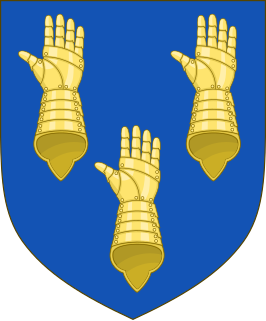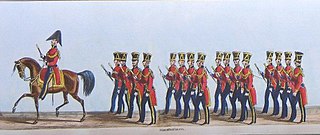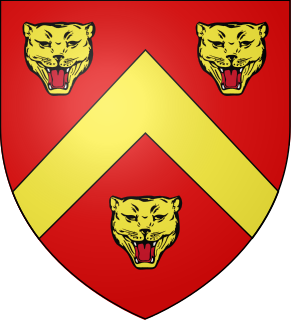Related Research Articles

Field Marshal Henry Seymour Conway was a British general and statesman. A brother of the 1st Marquess of Hertford, and cousin of Horace Walpole, he began his military career in the War of the Austrian Succession. He held various political offices including Chief Secretary for Ireland, Secretary of State for the Southern Department, Leader of the House of Commons and Secretary of State for the Northern Department. He eventually rose to the position of Commander-in-Chief of the Forces.

Viscount Falmouth is a title that has been created twice, first in the Peerage of England, and then in the Peerage of Great Britain. The first creation came in the Peerage of England in 1674 for George FitzRoy, illegitimate son of King Charles II by Barbara Villiers. He was created Earl of Northumberland at the same time and in 1683 he was made Duke of Northumberland. However, he left no heirs, so the titles became extinct at his death in 1716.

Henry Vane, 1st Earl of Darlington, PC, known as Lord Barnard between 1753 and 1754, was a British politician who sat in the House of Commons from 1726 to 1753 when he succeeded to a peerage as Baron Barnard.
Sir Henry Watkin Dashwood, 3rd Baronet was an English country landowner and politician who sat in the House of Commons between 1775 and 1795.
Cornwall is a former county constituency covering the county of Cornwall, in the South West of England. It was a constituency of the House of Commons of England then of the House of Commons of Great Britain from 1707 to 1800 and of the House of Commons of the United Kingdom from 1801 to 1832. It was represented by two Knights of the Shire, elected by the bloc vote system.

Sir Charles Frederick KB FRS was a British politician who sat in the House of Commons from 1741 to 1784.

Henry Fane was a British politician who sat in the House of Commons for 30 years between 1772 and 1802.
Lieutenant-General Sir John Vaughan KB, styled The Honourable from 1741, was a British soldier and a Member of Parliament in both the British and Irish Parliaments. During the American Revolutionary War he served in both the American and West Indies theaters.

The Knight Marshal is a former office in the British Royal Household established by King Henry III in 1236. The position later became a Deputy to the Earl Marshal from the reign of King Henry VIII until the office was abolished in 1846.

George Parker, 4th Earl of Macclesfield PC, styled Viscount Parker between 1764 and 1795, was a British peer and politician who sat in the House of Commons between 1777 and 1795.

Sir John Evelyn, 2nd Baronet was a British courtier and Whig politician who sat in the House of Commons for 40 years from 1727 to 1767.
General Hugh Boscawen, 2nd Viscount Falmouth, styled The Honourable Hugh Boscawen between 1720 and 1734, was a British soldier and politician.
Lieutenant-General George Boscawen was a British Army officer and politician, the fourth son of Hugh Boscawen, 1st Viscount Falmouth.

Sir William Owen, 4th Baronet (1697?–1781), of Orielton, Pembrokeshire, was a Welsh politician who sat in the House of Commons for 52 years from 1722 to 1774.
Colonel John Selwyn of Matson, Gloucestershire, was a British Army officer, courtier and politician who sat in the House of Commons between 1715 and 1751.
Sir Sidney Meadows was a British Member of Parliament.
Sir Roger Mostyn, 5th Baronet was a Welsh landowner and politician who sat in the House of Commons for 38 years from 1758 to 1796.
Glyn Wynn was a Welsh soldier and politician who sat in the House of Commons for 22 years from 1768 to 1790.
Hugh Barlow was a British politician who sat in the House of Commons for 24 years from 1774 to 1809.
Francis Cockayne Cust was a British lawyer and politician who sat in the House of Commons between 1770 and 1791.
References
- 1 2 3 "BOSCAWEN, Hugh (d.1795), of Windlesham, Surr". History of Parliament Online. Retrieved 4 October 2017.
- ↑ The Queen’s Bodyguard of the Yeoman of the Guard